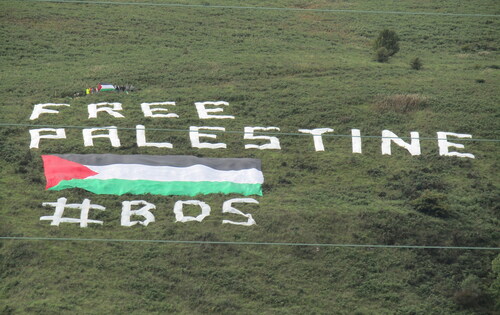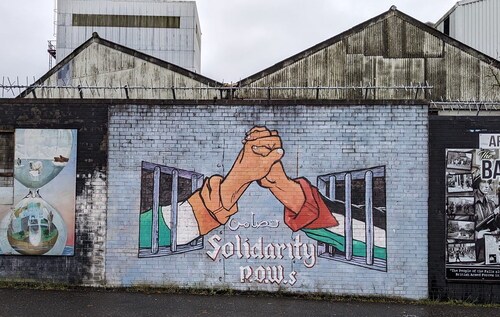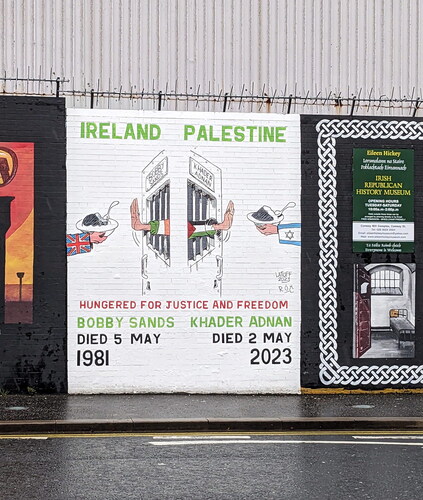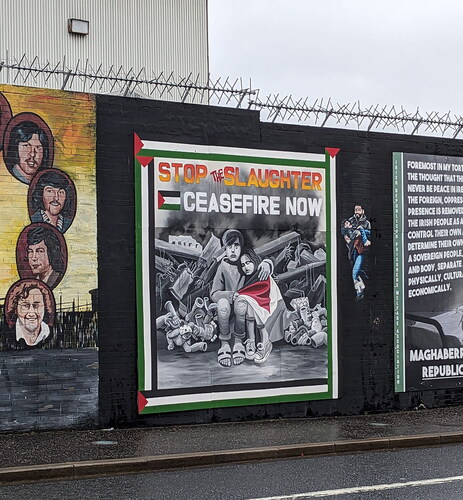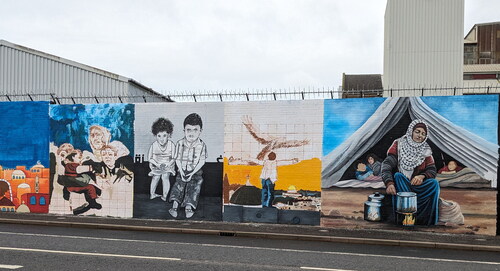Abstract
Irish solidarity with the Palestinian struggle for liberation is well documented. The shared experience of resisting state-sponsored colonial violence has helped to embed this transnational solidarity, especially among grassroots activists. Yet despite these similarities, there are critical differences between the two struggles that require careful consideration. In this essay, the author foregrounds the bonds of connection between Ireland and Palestine while arguing for the need to avoid platforming unnuanced, romantic, and mystical sentiments in light of Ireland’s “unfinished revolution” and the Irish government’s largely conservative approach to Palestinian liberation. He concludes that Ireland is far from an exemplar of postcoloniality and stresses that it is the activist community in Ireland that has been leading the call for full Palestinian liberation.
Collectives of oppressed people discover themselves, their strengths, and their humanity, through struggle. If you don’t resist, you don’t struggle, you don’t discover it. You don’t even discover your own humanity, much less that of others.
Eqbal AhmadFootnote1
Overlooking my home city of Belfast in the north of Ireland lies Sliabh Dubh, translated into English as “Black Mountain.” It is not particularly foreboding, more a medium-sized hill, especially relative to the more majestic Mourne Mountains, a mere forty-five-minute drive away. But in keeping with our proclivity for transforming public spaces into live canvases for political expression since the 1980s—the Irish tradition of “drawing support”Footnote2—Sliabh Dubh has become a larger-than-life arena of political dissent, with an area known locally as the Hatchet Field morphing into a site of political intervention. Led by the group Gael Force Art, the hill’s prominent location overlooking the city center has facilitated the creation and dissemination of rallying cries and expressions of transnational solidarity. From demands to end the siege on Cuba, to calls to endorse the legitimacy of an independent Catalonia, Sliabh Dubh reminds everyone who enters the city of Belfast that Ireland has a proud history of standing with the marginalized and oppressed.
But it is our comrades in Palestine who receive the lion’s share of artistic intervention: “End the Siege of Gaza,” “Free Palestine. #BDS,” “Viva Palestina,” and “UN 194” are just some of our demands and slogans displayed on the side of the hill in recent years.Footnote3 Since October 7, 2023, as the world yet again witnesses and facilitates unchecked Israeli state-sponsored terror on the Gaza Strip, Belfast’s hillside again cries out, demanding a “Free Palestine” and endorsing the call for “#BDS.” Artistic interventions have also emerged in our urban spaces, with solidarity murals popping up on Belfast’s famous “international wall,”Footnote4 collectively confirming that the Hatchet Field speaks for all of us who acutely feel the transnational bonds with our sisters and brothers in struggle in Palestine.
Figure 2. Image of mural with fist and “we stand with Palestine,” painted in 2023 during the ongoing genocidal assault on Gaza.
Source: Photo taken by Brendan Ciarán Browne, 2023.
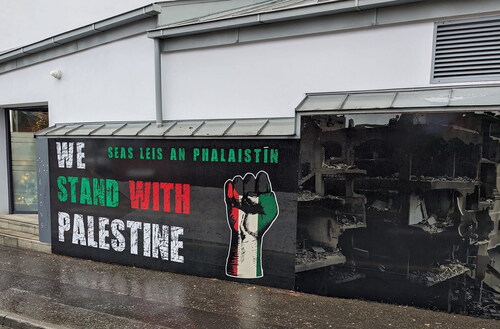
Beyond Belfast, visitors to Ireland will be struck by the general atmosphere of solidarity with Palestine, with public displays of support evident not only during times of catastrophic flare-up, but discernable year-round. Echoing the sentiment captured on our gable end walls and street corners, the Palestinian flag adorns Irish republican spaces and has been hoisted proudly on top of city halls across major Irish towns and cities since the genocide in Gaza began. Our solidarity activism network for Palestine is vast, transcends the border that divides the island, and comprises advocacy organizations, NGOs, trade unions, academic networks, interfaith organizations, student unions, individual activists, cultural groups, sport teams, and left-leaning political parties, to name only a few. Twenty-three of these groups have joined forces under the banner of the Irish Anti-Apartheid Campaign for Palestine, working collaboratively to bring an end to the Israeli apartheid regime. Others have taken part in direct action to confront the occupation, including those who joined the 2009 Lifeline 3 humanitarian convoy in an effort to break the siege on Gaza. On an individual level, too, Irish activists have a proud history of traveling to Palestine to engage in solidarity work, including individual doctors working with local NGOs delivering frontline healthcare across the West Bank by way of mobile clinics,Footnote5 and academics working at Palestinian universities.Footnote6
Ireland’s centuries-old struggle against British colonialism—some say historic, others argue enduring—foments a natural connection and empathy with other colonized peoples, including Palestinians resisting Zionist settler colonialism. Indeed, we in Ireland are all too familiar with British colonial practices, many of which were trialed on the Irish population before being exported to other sites of empire. Violent, forcible displacement of the native population, foreign settler plantation, genocide by starvation,Footnote7 and the attempted erasure of a native culture, including language, arts, and customs, are shared experiences that resonate with us when it comes to Palestinians’ ongoing resistance to Zionism.
Our transnational connection has led to those engaged in armed struggle in both sites breaking bread together in Lebanon,Footnote8 building on the wider energy of a global anti-colonial awakening. Palestinian and Irish inmates have also shared personal experiences and testimonies of resisting the violence of colonial incarceration, evidence of which can be gleaned from the pages of prisoners’ diaries and in communications that were safely smuggled out of prison and subsequently archived at the Abu Jihad Museum in Abu Dis, in occupied Jerusalem. Housing these precious documents in a museum named after the Palestinian political prisoner and martyr, Khalil al-Wazir or “Abu Jihad”—a leader in the first intifada and a staunch advocate for prisoners’ rights, who was assassinated by Israel in Tunisia in 1988—holds undeniable significance for Palestinians and their Irish allies in the respective prisoner movements.Footnote9
The self-sacrifice of hunger strike, the supreme act of nonviolent resistance in pursuit of liberation, is a revolutionary form of emancipation that transcends international borders and that remains sacrosanct to both the Irish republican and Palestinian prisoner movements.Footnote10 As I am always reminded when sitting with comrades in Palestine, the Irish republican hunger strike of 1981, which resulted in the death of ten men, is a feat of endurance widely respected among the Palestinian resistance. The close bonds between the prisoner movements were further reaffirmed on May 2, 2023, when representatives from the Bobby Sands Trust—an organization “established to publish, promote and keep in print the extraordinary writings of Bobby Sands,”Footnote11 arguably Ireland’s most famous hunger striker—sent their condolences in writing to the widow of Khader Adnan, Randa Mousa, upon his martyrdom through hunger strike in Zionist detention. They stressed that “Khader was the victim of a punitive and cruel Israeli occupation that singled him out for his vocal stance on Palestinian nationhood.”Footnote12 It is therefore abundantly clear that the bonds of solidarity between the Irish and Palestinian people are deeply embedded and unbreakable.
Despite similarities in confronting British colonialism in Ireland and Zionist settler colonialism in Palestine, very real differences remain—differences that are often lost amid the mysticism and wistful, romantic sentiment of transnational solidarity, and to which we in Ireland must be attuned. Perhaps most evidently, Ireland’s independence from British rule is incomplete. The island was only partially liberated in 1921, leading to the formation of a new Irish Free State and a violent colonial partition.Footnote13 This resulted in the minority Irish Catholic population in the six counties in the north remaining under British colonial control, enduring state-sponsored supremacy of one religious group over another, decades of sectarian policing, and deeply embedded, state-sponsored discrimination across various aspects of life.
Over thirty years of armed conflict in Ireland involving a hybrid mix of actors—Irish republican groups, Loyalist armed factions, and emanations of the British state, including the army and the local police force—resulted in the loss of over 3,700 lives and the creation of a deeply divided and segregated society. This most recent phase of armed conflict drew to a close following a series of ceasefires and intense diplomacy, leading to the emergence of an internationally sponsored “peace process” in 1998, one that has fundamentally altered our social and political landscape and ushered in a new era of partial postcoloniality. Subsequently, a reimagining and reshaping of the best way to confront the residual trappings of British colonial violence has been the goal of those committed to securing Irish unity—a unity that is based purely on political consensus, dialogue between all interested parties, and an end to the lingering structural violence that continues to undermine the prospect of an equitable and sustainable peace.
When considering our own continuing experience of coloniality, we must therefore never forget that Ireland remains divided—despite the birthing of a “successful” peace process—an unavoidable fact that some detractors use as evidence of an “unfinished revolution.”Footnote14 Alternatively, many consider the emergence of a political route towards unification—in a space routinely described as being locked in a cycle of intractability—as pragmatic, with realists banking on the probability of a fully decolonial future through political processes that will eventually come to fruition. Those who have spent a lifetime struggling for a united Ireland, one that allows for mutual respect and tolerance for all, unequivocally accept that the rationale for engaging in armed struggle to achieve their goals no longer exists.Footnote15
Whichever way we choose to look at Ireland’s experience of ridding itself of British colonialism, in Palestine, the luxury of “peacebuilding” has never existed, nor has the option to put down arms. That is, while many of our Palestinian comrades might have an understanding of, and appreciation for, Ireland’s anti-colonial struggle, and while many might view the decades-long Irish campaign for independence as an example of revolutionary success, in Palestine, “peacebuilding” has been a ruseFootnote16 routinely weaponized against the Palestinian population. It has been a smokescreen that has allowed for the expansion of the violent Zionist settler-colonial mission in historic Palestine under the watchful gaze of an impotent, negligent, and simultaneously fully complicit international community.Footnote17 Therefore, when it comes to reading Palestinian liberation through the lens of Ireland’s “unfinished revolution,” our engagement in acts of solidarity must carefully avoid placing the tactics we pursued in our own brand of anti-colonialism, and, most crucially, the compromises that we were collectively willing to accept, on a pedagogical pedestal.Footnote18
Indeed, as the solidarity movement across the island of Ireland grows, so, too, does it present challenges, particularly when it comes to circumnavigating disparate voices and the plurality of interpretations about which strategies of solidarity to pursue. Our work runs the risk of becoming diluted at a time when the need to have a clear, concise, and deliverable message is more pressing than ever. “Solo run” advocacy strategies can inadvertently lead to a hierarchy should they end up lobbying governments in pursuit of promoting “single issues” in isolation, and in a way that detracts and distracts from the overarching decolonial goal. In Ireland, our platforming of the illegality of produce from Israeli settlements is a case in point.Footnote19 It may shine light on one facet of the reality of Zionist settler colonialism, but the effective and desired call of the Boycott, Divestment and Sanctions (BDS) movement has to be positioned alongside other forms of popular resistance and struggle. It must never be the case that we in Ireland fragment and dilute Palestinian demands for a full, justice-oriented decolonial reality by promoting tactics that reflect our own “Made in Ireland” interpretations of “peacebuilding,” those that can only honestly be appraised as partially successful.
And while the Irish governmentFootnote20 may appear more vocal than its European counterparts in its public condemnation of the Israeli regime,Footnote21 it would be wholly inaccurate to suggest that its position is radical, progressive, or one that reflects broader pro-Palestinian sentiment of the grassroots Irish solidarity movement. Far from being an active voice in pursuit of Palestinian liberation, establishment political parties in Ireland—those that have been at the forefront of Irish political life since the formation of the Irish Free State following partial independence from Britain in 1921—have remained broadly conservative and aligned to the wider Western imperial project.
Despite appearing to be somewhat of a European outlier, the Irish government’s performative statements have thus been exactly that: performative. Their position mirrors that of the EU and the US government, one that has been exposed for its full complicity in aiding and abetting the ongoing genocide in Gaza, and in displaying a complete indifference to the suffering of Palestinians. Alongside the EU and US government, the Irish government is failing to rein in the genocidal actions of its Israeli ally, a point vociferously made by Clare Daly, one of Ireland’s Members of the European Parliament (MEP).Footnote22 Speaking in a plenary session of the European Parliament on January 16, 2024, Daly referred to the US president as “Butcher Biden,” echoing the sentiments of other Irish anti-establishment politicians, including Richard Boyd Barrett, leader of the socialist People Before Profit Party (PBP).Footnote23 And rather than heed the calls of the grassroots solidarity movement in expelling the Israeli ambassador in the midst of the genocide, the party of government, Fianna Fáil (FF), invited her as a guest to its annual Ard fheis (party conference) on November 4.Footnote24 The party again revealed how out of touch it is by later choosing to hold a reception for the ambassador in the Dublin mayor’s residence, Mansion House, on November 29, the International Day of Solidarity with the Palestinian People—an invitation that was subsequently rescinded under significant grassroots pressure.Footnote25
Ireland’s political left, including parties with a longstanding and impressive record of standing in solidarity with the cause of a liberated Palestine, most notably Sinn Féin (SF) and PBP, have made concerted efforts to hold the Irish government to account.Footnote26 Since the genocide, and alongside other smaller political parties that make up Dáil Éireann, the lower house of Ireland’s national parliament, the Irish Left has tabled motions calling for an expulsion of the Israeli ambassador in Ireland, and for the Irish government to both join the South African case against Israel before the International Court of Justice (ICJ) and refer members of the Israeli government to the International Criminal Court.Footnote27 The outcome of the ICJ hearing—which held that there was a “plausible” case that the Israeli state was engaging in acts that may be construed as genocidal or seen as an intent to commit acts of genocide—has led Ireland’s left-wing parties to further push for the Irish government to add its support to the South African case. Their position broadly reflects the wider consensus of the solidarity community across Ireland, and these interventions, while unsuccessful at the time of writing, have been seen as a positive demonstration of the Irish people’s unwavering support for the Palestinian cause.
Yet even the Left’s efforts can at times be myopic and internally fractured. It took a concerted grassroots campaign to bring pressure on SF to join the broad left-wing activist demand to expel the Israeli ambassador. Similarly, when SF (seen by many as a future Irish government-in-waiting) invited the ambassador of the State of Palestine to Ireland to their own party conference on November 11, with those in attendance giving her a rapturous reception,Footnote28 many of us in the solidarity movement with decades of experience working with Palestinians and in Palestine, thought this gesture clumsy. In building true bonds of solidarity in Ireland, we cannot overlook the significant disconnect between the Palestinian Authority and the Palestinian people across colonized Palestine and the world, the nuances of which perhaps become blurred by the realpolitik of transnational political diplomacy.
*****
As we struggle together in Ireland and Palestine, we must draw inspiration and strengthen our resolve by heeding the words of the inimitable Bernadette Devlin McAliskey: “We were born into an unjust system, we are not prepared to grow old in it.”Footnote29 While Ireland’s ongoing pursuit of complete liberation from British colonialization is deeply interconnected with other global, anti-colonial movements, uncritical application and promotion of the Irish experience of historic resistance and subsequent peacebuilding into the context of Palestine—a vastly different site of catastrophic, Western-sponsored Zionist settler-colonial violence—amounts to a value-based judgment that greatly undermines solidarity.Footnote30
How, then, should we read and understand Ireland’s incomplete yet seasoned pursuit of anti-colonial liberation alongside Palestine’s ongoing experience of overcoming Zionist settler-colonial terror? In remaining steadfast in our support of full Palestinian liberation as Irish allies, how do we ensure that we provide a solidarity that doesn’t prioritize poorly conceived “hot-take” resistance strategies and, in so doing, inadvertently soften the sharp edges of anti-colonial struggle? Indeed, Zionist settler-colonial violence in Palestine is continuously evolving and developing, necessitating careful and constant (re)evaluation on how best to deliver the blow that will bring it to a decisive end. In Ireland, we must tread carefully, adapt, grow, resist, and respond accordingly, in communion with those leading the struggle on the ground in Palestine. We must constantly ensure that we “safety check” our solidarity as our own unfinished revolutionary moment remains to be realized.
Ultimately, Ireland’s partial post-coloniality is far from utopian. The hard-fought-for benefits of an end to British colonization, and a fundamental revaluation of our relationship with capital production, are not enjoyed richly and equitably by all of the island’s citizens. In developing the new Irish Free State, we have in many ways failed to heed Frantz Fanon’s warnings in The Wretched of the Earth,Footnote31 having instead reproduced dependencies that are “nothing more than a new instrument of imperial domination.”Footnote32 Racial othering remains a problem, blatantly shown through the exploitation of those who have reached our island seeking asylum, and through a slow and insidious rise in anti-migrant sentiment that demonstrates a callousness and gross amnesia when it comes to our own history of global migration.Footnote33 Therefore, despite our clear commitment to fostering strong anti-colonial solidarities with our Palestinian comrades, we in Ireland must avoid backslapping our perceived successes and ensure that we acknowledge and critique our own blind spots and limitations. Only by doing so will we be able to highlight the intersectional vulnerabilities in our intertwined and enduring struggles against colonial violence, wherever they may be present.
Figure 6. Image of “our struggle continues” mural.
Source: Photo taken by Brendan Ciarán Browne, 2023.
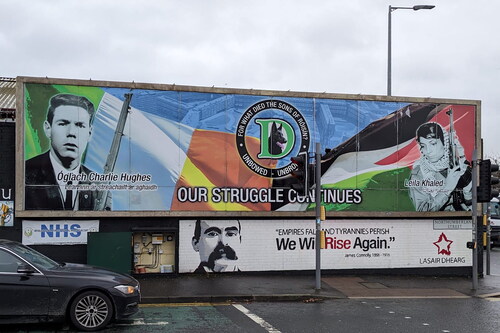
Most crucially, Irish solidarity with Palestine has always been grassroots driven, and this, it must remain. As we expand and grow, we must ensure that we shirk promoting and inculcating a dominant and complacent liberal narrative so as to ensure that the parameters of our solidarity are not determined by those who occupy positions of privilege—those conservative parliamentarians who have shown little interest in heeding the demands of solidarity activists who have been screaming across Ireland in their thousands demanding Palestinian liberation from Zionist apartheid and occupation. Only through the development of greater awareness of these myriad challenges and limitations are we best placed to move more meaningfully in unison toward the inevitable realization of our connected liberatory futures.
Additional information
Notes on contributors
Brendan Ciarán Browne
Brendan Ciarán Browne is an assistant professor of conflict resolution/coimhlint rún & athmhuintearas and a fellow of Trinity College, Dublin. His book, Transitional (in)Justice and Enforcing the Peace on Palestine (Cham: Springer Nature Switzerland AG, 2023), nominated for a 2023 Palestine Book Award, examines transitional justice in the context of Palestine. He has been working on and in Palestine for over fourteen years, and previously held academic roles in occupied Jerusalem. He is based in Belfast.
Notes
1 Eqbal Ahmad, Confronting Empire: Interviews with David Barsamian (Cambridge, MA: South End Press, 2000), 23.
2 For more on the significance of this phenomenon across the north of Ireland, see Bill Rolston, Drawing Support: Murals in the North of Ireland (Belfast, Ireland: Beyond the Pale Books, 1992).
3 For a full overview of the work of Gael Force Art, see “Sliabh Dubh/Black Mountain,” Extramural Activity website, accessed January 25, 2024, https://extramuralactivity.com/sliabh-dubhblack-mountain/.
4 “The International Wall (Divis Street),” Extramural Activity website, accessed January 25, 2024, https://extramuralactivity.com/the-international-wall-divis-street/.
5 See Emma Keelan “Medical Care in Palestine: Working in a Conflict Zone,” Ulster Medical Journal 85, no. 1 (2016): 3–7, https://www.ums.ac.uk/umj085/085(1)003.pdf.
6 For reflections on the author’s personal experience at an academic institution in Palestine in 2015, see Brendan C. Browne, “Education under Occupation: Everyday Disruption at a Palestinian University,” Conversation, October 14, 2015, https://theconversation.com/education-under-occupation-everyday-disruption-at-a-palestinian-university-49035.
7 For an examination of the Irish famine, known as An Gorta Mór, and the claim of genocide, see Robbie McVeigh “‘The Balance of Cruelty’: Ireland, Britain and the Logic of Genocide,” Journal of Genocide Research, 10, no. 4 (2008): 541–61, https://doi.org/10.1080/14623520802447792.
8 The detail around these meetings remains a highly guarded secret. In 2011, I interviewed a former senior member of the Provisional Irish Republican Army (PIRA), someone with intimate knowledge of these meetings, who would not divulge anything beyond confirming that they took place. Again, I made a further request for details of these meetings in 2023 and was informed that the information remains closely guarded.
9 For more detail on the museum, see Alex Lubin, “Resistance Museum in Abu Dis,” Middle East Report 275 (Summer 2015): https://merip.org/2015/06/resistance-museum-in-abu-dis/.
10 For more insights into the shared connection between the Irish and Palestinian prisoners’ movements, see Norma Hashim and Yousef M. Aljamal, A Shared Struggle: Stories of Palestinian and Irish Hunger Strikers (Belfast, Ireland: An Fhuiseog, 2021).
11 “Writings,” Bobby Sands Trust website, accessed January 25, 2024, https://www.bobbysandstrust.com/writings/.
12 “Death of Khader Adnan,” Bobby Sands Trust website, May 2, 2023, https://www.bobbysandstrust.com/death-of-khader-adnan/.
13 The Irish Free State comprises twenty-six counties. The six northern counties remain as the separate state of Northern Ireland under the control of the British government.
14 For a recent analysis of this very critique, see Robbie McVeigh and Bill Rolston, ‘Anois ar theacht an tSamhraidh’: Ireland, Colonialism and the Unfinished Revolution (Belfast, Ireland: Beyond the Pale Books, 2021).
15 Critical scholars will also be aware that the rationale for engaging in armed struggle, as opposed to other forms of nonviolent resistance, is one that divides Irish nationalist opinion in the north of Ireland.
16 Inès Abdel Razeq, “Thirty Years On: The Ruse of the Middle East Peace Process,” Al-Shabaka: The Palestinian Policy Network, October 31, 2021, https://al-shabaka.org/briefs/thirty-years-on-the-ruse-of-the-middle-east-peace-process/.
17 Yara Hawari, “The Revival of People-to-People Projects: Relinquishing Israeli Accountability,” Al-Shabaka: The Palestinian Policy Network, April 6, 2021, https://al-shabaka.org/briefs/the-revival-of-people-to-people-projects-relinquishing-israeli-accountability/.
18 For more information on this critique, see Brendan C. Browne and Elaine Bradley, “Promoting Northern Ireland’s Peacebuilding Experience in Palestine-Israel: Normalising the Status Quo,” in Third World Quarterly 42, no. 7 (2021): 1625–43, https://doi.org/10.1080/01436597.2021.1903310.
19 “Irish Lower House Passes Bill to Ban Israeli Settlement Goods,” Al Jazeera, January 25, 2019, https://www.aljazeera.com/news/2019/1/25/irish-lower-house-passes-bill-to-ban-israeli-settlement-goods.
20 The current government in the Irish Republic is a coalition arrangement comprising the two main establishment parties on the island, Fianna Fáil and Fine Gael. For a useful insight into the politics of both parties, see Jack Sheehan, “Who Is Fianna Fáil for? A Dwindling, Increasingly Regionalised Demographic,” Irish Times, June 17, 2023, https://www.irishtimes.com/opinion/2023/06/17/who-is-fianna-fail-for-a-dwindling-increasingly-regionalised-demographic/.
21 Aysu Bicer, “History of Solidarity: Why Ireland Stands Out in EU as Fierce Defender of Palestinian Rights,” Anadolu Agency, October 18, 2023, https://www.aa.com.tr/en/europe/history-of-solidarity-why-ireland-stands-out-in-eu-as-fierce-defender-of-palestinian-rights/3024978.
22 Nur Asena Erturk, “‘This Isn’t Just Israel’s Genocide. It’s Europe’s Too’: Irish MEP,” Anadolu Agency, November 10, 2023, https://www.aa.com.tr/en/europe/this-isnt-just-israels-genocide-its-europes-too-irish-mep/3050248.
23 Burak Bir and Zuhal Demirci, “‘Apartheid Settler Colonial State’ Israel Built on Ethnic Cleansing of Palestinians: Irish Lawmaker,” Anadolu Agency, last modified November 15, 2023, https://www.aa.com.tr/en/europe/-apartheid-settler-colonial-state-israel-built-on-ethnic-cleansing-of-palestinians-irish-lawmaker/3053165.
24 Simon Kelly, “Israeli Ambassador Appearance at Fianna Fáil Ard Fheis Sparks Outrage,” JOE, November 4, 2023, https://www.joe.ie/news/israeli-ambassador-fianna-fail-ard-fheis-785444.
25 Olivia Kelly, “Disquiet as Lord Mayor Agrees to Meet Israeli Ambassador on Palestinian Solidarity Day,” Irish Times, November 21, 2023, https://www.irishtimes.com/politics/2023/11/21/disquiet-as-lord-mayor-agrees-to-meet-israeli-ambassador-on-palestinian-solidarity-day/.
26 Paul Salvatori, “In Praise of Richard Boyd Barrett: A Pro-Palestinian Politician with Integrity,” Palestine Chronicle, March 18, 2022, https://www.palestinechronicle.com/in-praise-of-richard-boyd-barrett-a-pro-palestinian-politician-with-integrity/.
27 Lauren Boland and Eimer McAuley, “Government Defeats Vote Seeking to Expel Israeli Ambassador and Impose Sanctions,” Journal, November 15, 2023, https://www.thejournal.ie/Ireland-israel-6223803-Nov2023/.
28 Joe Connor, “Palestinian Ambassador Receives Standing Ovation at Sinn Fein Conference,” London Economic, November 11, 2023, https://www.thelondoneconomic.com/politics/palestinian-ambassador-receives-standing-ovation-at-sinn-fein-conference-362857/.
29 Bernadette Devlin, The Price of My Soul (London: Pan Books, Ltd., 1969), 9.
30 Nadim Bawalsa, Brendan C. Browne, and Yara Hawari, “Exposing Colonial Peace-Building from Palestine to Ireland,” Al-Shabaka: The Palestinian Policy Network, October 20, 2021, https://al-shabaka.org/labs/exposing-colonial-peace-building-from-palestine-to-ireland/.
31 Frantz Fanon, The Wretched of the Earth, trans. Richard Philcox (New York: Grove Press, 2021).
32 As cited in Eqbal Ahmad, Confronting Empire: Interviews with David Barsamian (Cambridge, MA: South End Press, 2000), 111–12.
33 Masha Gessen, “Ireland’s Strange, Cruel System for Asylum Seekers,” New Yorker, June 4, 2019, https://www.newyorker.com/news/dispatch/irelands-strange-cruel-system-for-asylum-seekers.


